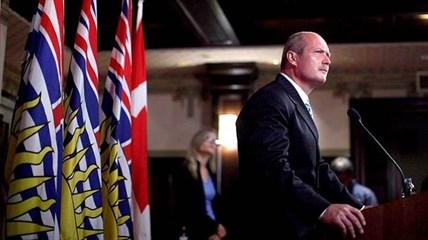
B.C. Finance Minister Mike de Jong is tabling a budget on Tuesday he says will have few goodies.
Image Credit: THE CANADIAN PRESS/Chad Hipolito
February 16, 2014 - 2:27 PM
VICTORIA - British Columbia's finance minister says the budget he is preparing to table Tuesday is balanced, but Mike de Jong is issuing the same warning he did with last year's pre-election fiscal plan: there are few goodies inside.
But de Jong says that's a good thing.
The finance minister said the three-year plan will forecast modest budget surpluses, which he said was a sign the Liberal government has stuck to its goals of controlling government spending during challenging times.
"I'd like to think people assign importance to government living within its means, particularly in the context of a time when very few governments are able to do that," said de Jong.
"There will not be huge swings in taxation policy. There won't be huge spending announcements. We're not at a point yet where that's possible within the context of the balanced budget."
Other than Saskatchewan, B.C. is the only province to balance its books.
Federal Finance Minister Jim Flaherty said last week the Conservative government in Ottawa is on target to produce a balanced budget next year — ahead of a federal election — but this year he's still battling a deficit.
De Jong said holding the line on spending wasn't easy, but it produced results.
"It's interesting how quickly now some pundits dismiss (a balanced budget) as being insignificant," he said.
"In every other province it would be huge news and yet because of the discipline that we've brought, people accept that as a given. It's been hard getting to this point."
The next B.C. election is set for May 2017.
De Jong has already said the budget will not include revenue estimates from the development of the liquefied natural gas industry. He said the government is still refining its regulatory and taxation policies for the prospective new industry and legislation won't be tabled until the fall.
Premier Christy Clark says LNG development represents a trillion-dollar economic opportunity for B.C. that could create up to 100,000 jobs. Last year, she outlined plans for a fund that she predicted would build enough resource revenues to pay off B.C.'s debt, currently hovering at $60 billion and rising.
Canadian Taxpayers' Federation B.C. spokesman Jordan Bateman said Clark's promise of LNG revenues is still just a promise, and until that money appears — if it ever does — the Liberals should continue their tight-wad financial ways.
"I want to believe in LNG," said Bateman. "I'm hoping for LNG, but you've got to plan like it's not going to be there. It's really important this government keep thinking it's broke and keeps grinding out the savings wherever they can find them. Keep holding the line on spending. Don't get too crazy on borrowing."
He said de Jong and the Liberals deserve to crow about their balanced budget, especially after going into an campaign last spring without any expensive election promises.
"They deserve credit — they held the line on spending," Bateman said.
"It would have been easy for them to go into the election and throw around hundreds of millions of dollars in goodies to try and buy votes. To their credit, they didn't and it's going to turn into what looks like a surplus this year."
But Bateman said he'll be looking for the Liberals to control the provincial debt, which is forecast to rise above $60 billion this year.
Opposition New Democrat finance critic Mike Farnworth said he'll look to see if the B.C. budget factors in costs associated with fewer federal health dollars and the recent B.C. Supreme Court judgment that found the Liberal government should not have removed the rights of teachers to bargain class sizes and their composition as part of their collective agreement.
The government said it will appeal the ruling. Education Minister Peter Fassbender said reinstating previous contract language governing class size and composition could cost the government up to $1 billion.
"Does (the budget) address the very serious skill shortage in this province?" Farnworth said. "Does it allow the resource-based ministries to do the job they have been hampered in doing because of the cuts over the last number of years? It's going to be interesting to see what their figures are."
News from © The Canadian Press, 2014